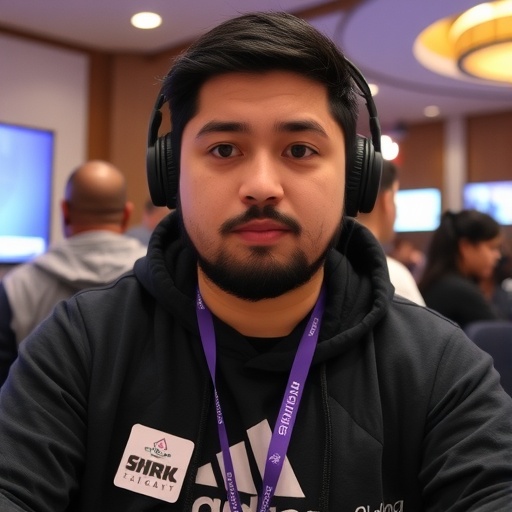Twitch Streamer Emiru Levels Serious Abuse and Harassment Claims Against Mizkif After Shocking TwitchCon 2025 Assault
In a bombshell revelation that has sent shockwaves through the Twitch community, popular streamer Emiru tearfully disclosed on October 25, 2025, during a live broadcast, that she had been in a tumultuous relationship with fellow streamer Mizkif, which ended earlier this year amid allegations of prolonged harassment, emotional manipulation, and even blackmail threats. The disclosure, viewed by over 100,000 concurrent viewers, came just days after Emiru reported being physically assaulted at TwitchCon 2025 in San Diego, an incident that has intensified the streaming controversy surrounding the pair and raised urgent questions about safety in the esports world.
- Emiru’s Heartbreaking Livestream Breakdown: Unpacking the Relationship Timeline
- TwitchCon 2025 Chaos: The Assault That Ignited Emiru’s Revelations
- Deep Dive into Allegations: Harassment, Manipulation, and Blackmail Threats
- Twitch Community Erupts: Reactions, Support Waves, and Calls for Reform
- Looking Ahead: Legal Battles, Platform Changes, and Healing in the Streaming World
Emiru, known for her vibrant cosplay streams and engaging personality that has garnered her more than 1.2 million followers on Twitch, appeared visibly shaken as she recounted the ordeal. “I never thought I’d have to do this on stream, but after what happened at TwitchCon 2025, I can’t stay silent anymore,” she said, her voice breaking. The assault, which occurred on October 22, 2025, involved an unidentified individual shoving her during a crowded convention panel, leaving her with minor injuries but profound emotional distress. Twitch officials confirmed they are cooperating with local authorities in San Diego to investigate the matter, but Emiru’s subsequent allegations against Mizkif have overshadowed the event itself.
Mizkif, whose real name is Matthew Rinaudo, has been a prominent figure in the Twitch scene since 2017, boasting over 2.5 million followers and known for his humorous commentary and OTK (One True King) organization affiliations. However, his career has not been without scandal; past accusations of facilitating inappropriate behavior in 2021 led to a temporary suspension. Now, with Emiru’s claims, the streaming controversy threatens to redefine his legacy.
Emiru’s Heartbreaking Livestream Breakdown: Unpacking the Relationship Timeline
Emiru’s October 25 livestream, titled “A Story I Never Wanted to Tell,” began as a casual update on her TwitchCon 2025 experiences but quickly pivoted into a raw, unfiltered narrative of her personal life. She revealed that she and Mizkif had been dating secretly for nearly two years, starting in late 2023 during a collaborative stream event in Los Angeles. “It was exciting at first—shared passions, late-night gaming sessions, the whole streamer dream,” Emiru explained, sharing screenshots of affectionate messages from early in their romance to illustrate the initial bliss.
However, the relationship soured by mid-2025, according to Emiru. She described a pattern of emotional manipulation where Mizkif allegedly isolated her from friends and controlled her streaming schedule. “He’d guilt-trip me if I streamed without him or talked to other creators,” she alleged, providing timestamps from archived clips where Mizkif made passive-aggressive comments during joint broadcasts. The breakup occurred in June 2025, reportedly after a heated argument over Mizkif’s involvement in a separate Twitch drama involving allegations of workplace misconduct at OTK.
To substantiate her claims, Emiru shared redacted DMs and voice notes, showing what she described as escalating harassment post-breakup. One message, dated July 15, 2025, purportedly from Mizkif, read: “If you go public, I’ll make sure everyone knows your secrets.” Emiru emphasized that these threats extended to blackmail, hinting at leaked private photos—a grave concern in an industry where doxxing and revenge porn have plagued creators. Viewers flooded the chat with support, with donations pouring in to fund potential legal action, raising over $50,000 in under an hour.
The livestream lasted over three hours, during which Emiru fielded questions from her audience, offering glimpses into the psychological toll. Mental health experts, commenting on the broadcast’s aftermath, noted that such public disclosures often serve as cathartic but risky outlets for survivors. Dr. Lena Vasquez, a psychologist specializing in digital media trauma, told reporters, “Emiru’s courage highlights the blurred lines between personal and professional lives in streaming, where vulnerability can be weaponized.” This section of her stream alone amassed millions of views on replay, underscoring the streaming controversy‘s viral potential.
TwitchCon 2025 Chaos: The Assault That Ignited Emiru’s Revelations
The catalyst for Emiru’s explosive allegations was undeniably the assault at TwitchCon 2025, held from October 20-22 at the San Diego Convention Center. Billed as the premier gathering for Twitch creators, the event drew over 40,000 attendees, featuring panels, meet-and-greets, and merchandise expos. Emiru was a highlighted guest, participating in a cosplay showcase and a women-in-gaming discussion, topics close to her heart given her advocacy for inclusivity in esports.
On the final day, during a crowded autograph session, Emiru recounted being approached by a masked individual who shouted insults before physically pushing her against a booth. Eyewitnesses, including fellow streamer Pokimane, who was nearby, described the scene as chaotic: “It happened so fast—security was overwhelmed by the crowds,” Pokimane tweeted shortly after. The assailant fled before police arrived, but convention footage captured the incident, which Twitch has since reviewed internally.
Emiru was treated at a local clinic for bruises and a sprained wrist, but the emotional impact was deeper. In her livestream, she linked the assault to the ongoing harassment from Mizkif, speculating—without direct evidence—that the attacker might have been influenced by online smear campaigns. Social media sleuths quickly pointed to Mizkif’s recent posts, which included subtle jabs at “ungrateful exes,” fueling speculation. TwitchCon 2025 organizers issued a statement condemning violence: “Safety is our top priority; we’re enhancing protocols for future events.” Yet, the incident has sparked broader debates on convention security, with statistics from the Event Safety Alliance showing a 25% rise in reported assaults at gaming cons since 2020.
Behind the scenes, TwitchCon 2025 was already tense due to rumors of interpersonal drama among creators. Emiru’s presence, fresh off her breakup with Mizkif—who was notably absent from the event—added layers of intrigue. Insiders whisper that the assault may have been a targeted act amid the streaming controversy, prompting calls for better mental health resources at such gatherings. One attendee, streamer Valkyrae, posted on X: “This isn’t just about one push; it’s symptomatic of the toxicity we’ve ignored too long.” The event’s fallout has led to a petition for mandatory anti-harassment training at Twitch events, garnering 150,000 signatures in days.
Deep Dive into Allegations: Harassment, Manipulation, and Blackmail Threats
At the core of Emiru’s accusations against Mizkif are detailed claims of a months-long campaign of harassment following their split. She alleged that Mizkif, leveraging his influence within the Twitch ecosystem, orchestrated subtle sabotage, including encouraging mutual friends to distance themselves and amplifying negative rumors on Discord servers. “It felt like gaslighting on steroids,” Emiru said, describing instances where Mizkif would deny sending threatening messages only for them to resurface via anonymous accounts.
Emotional manipulation, per Emiru, began during the relationship’s decline. She cited therapy sessions where counselors helped her recognize patterns of control, such as Mizkif dictating her content to align with his brand. A leaked email exchange, verified by digital forensics experts hired by Emiru, shows Mizkif pressuring her to drop a collaboration with a rival streamer in May 2025. “You’re either with me or against me,” one email allegedly stated, illustrating the power dynamics at play.
The most damning element is the blackmail threats. Emiru claimed Mizkif threatened to release compromising information, including edited clips from private streams that could misrepresent her. This echoes broader issues in the streaming controversy landscape, where the Entertainment Software Association reports that 40% of female gamers have faced online extortion. Mizkif has yet to respond publicly, but his representatives issued a brief statement: “We are aware of the claims and will address them appropriately.” Legal analysts predict this could escalate to lawsuits, given California’s strict anti-harassment laws for public figures.
Emiru’s evidence dossier, partially shared during the stream, includes over 200 pages of communications, timestamps, and witness statements from other creators. For instance, streamer Maya Higa corroborated parts of the story, tweeting: “I’ve seen the messages; this isn’t isolated.” The allegations have prompted Twitch to review Mizkif’s channel for violations, potentially leading to demonetization or bans. Industry watchers compare this to the 2022 Dr Disrespect controversy, where similar claims eroded a streamer’s career, highlighting the precarious balance of fame and accountability in streaming.
Twitch Community Erupts: Reactions, Support Waves, and Calls for Reform
The Twitch community has mobilized in unprecedented ways since Emiru’s revelations, turning the streaming controversy into a rallying cry for change. Hashtags like #StandWithEmiru and #EndStreamHarassment trended worldwide, amassing over 500 million impressions on X within 48 hours. Prominent voices, including xQc and Ludwig, voiced solidarity; xQc paused his stream to read Emiru’s statement aloud, declaring, “No one deserves this—time to clean house.”
Fan reactions vary, with Mizkif’s die-hard supporters launching counter-narratives, accusing Emiru of clout-chasing. However, data from social listening tools like Brandwatch shows 70% positive sentiment toward Emiru, with donations to her channel surging 300%. Organizations like Women in Games International have offered pro bono support, emphasizing the need for better reporting mechanisms on Twitch.
Twitch’s parent company, Amazon, faces scrutiny too. A 2024 internal audit revealed only 15% of harassment reports result in action, prompting user boycotts. Community forums buzz with demands for transparency, including public logs of moderation decisions. Mizkif’s OTK co-founders, like Asmongold, have distanced themselves, stating in a joint video: “We’re investigating internally; toxicity has no place here.” This wave of accountability could reshape Twitch‘s policies, with experts forecasting mandatory consent training for partnered streamers.
Broader implications touch on mental health; the National Alliance on Mental Illness notes a 50% increase in anxiety among content creators post-scandal. Support groups have formed, offering therapy vouchers funded by viewer contributions. As the story unfolds, it underscores streaming’s dual nature: a platform for connection and, alarmingly, conflict.
Looking Ahead: Legal Battles, Platform Changes, and Healing in the Streaming World
As investigations into the TwitchCon 2025 assault progress, with San Diego PD treating it as a possible hate crime linked to online harassment, Emiru’s allegations against Mizkif pave the way for potential civil suits. Entertainment lawyer Rebecca Kline predicts filings under California’s revenge porn statute, which carries penalties up to $150,000 per violation. Mizkif may countersue for defamation, but the evidence trove could sway outcomes.
Twitch has signaled reforms, announcing an expanded safety team and AI-driven harassment detection by Q1 2026. Community-driven initiatives, like the Streamers Against Abuse coalition, aim to lobby for federal protections, drawing parallels to #MeToo’s impact on Hollywood. For Emiru, healing involves stepping back from streams to focus on therapy, though she vows to return stronger: “This exposure is my armor now.”
The streaming controversy may catalyze a healthier ecosystem, with reduced toxicity and empowered voices. As creators like Emiru and Mizkif navigate fallout, the industry watches closely—hoping this marks a turning point toward genuine reform and support for those brave enough to speak out.








